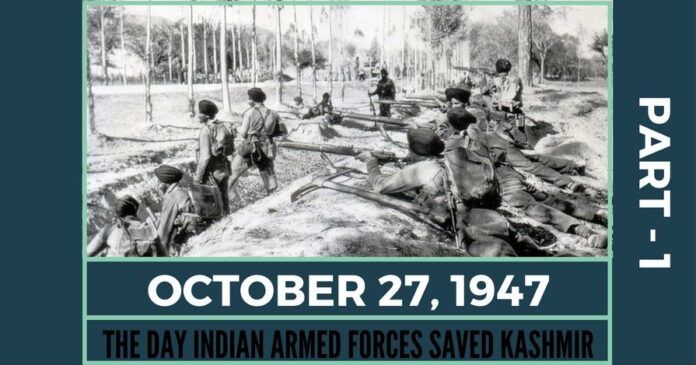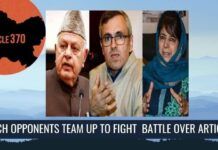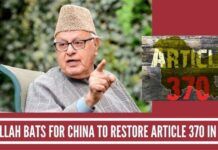
A two-part series on 71st anniversary of the historic day when Indian army first landed in Kashmir valley
PGURUS is making an attempt to bring to you the developments preceding the historic day when Maharaja Hari Singh, last Dogra ruler of the princely state of Jammu and Kashmir decided to accede to India and sent an SOS to the dispensation in New Delhi to rush troops to save Kashmir from falling in to the hands of Qabali invaders.
On October 27, 2017, once again people from different walks of life will come together to celebrate the 71st anniversary of this historic day when for the first time Indian army had landed in Kashmir valley to counter the attack mounted by the Qabali marauders with a sinister design to annexe Kashmir from the map of India.
Till date, many conspiracy theories find space in different media on the events preceding the spectacular operation conducted by the Indian armed forces to finally save the day.
All those brave hearts who led the operation and attained martyrdom in the line of duty became immortal and stories of their bravado find mention in the military history and history books as they all displayed raw courage and defied standard operating procedures when it came to defending their mother Nation against the onslaught of the invading Qabalis.
Now the question arises if politicians of all hues are emotionally connected with the fate of Jammu and Kashmir
On the other hand politicians belonging to different shades of opinion both in the mainstream and in the separatist camp and even those divided between Right wing, left wing and centrist raise voices from time to time to present their viewpoint on the emotive subject of complete integration of the princely state of Jammu and Kashmir with the Union of India.
Despite holding divergent viewpoints these politicians concur on one theme if the Indian armed forces had further delayed their arrival in Kashmir valley the history of the region would have been different and many existing political players would have never emerged on the political horizon of this vast country.
Now the question arises if politicians of all hues are emotionally connected with the fate of Jammu and Kashmir and how over a period of time its relationship with the Union of India has shaped destinies of millions of people why they remain a mute spectator all these years and instead of celebrating the day they stood tall in their own confines and ended up sending a confusing signal to the entire world that despite thanking the Indian armed forces for their valour and grit they continue to raise question marks over their very presence in the region and raise a demand to reduce their footprints even at the cost of compromising the strategic interests for their ulterior motives.
Isn’t it ironic that a state which celebrates July 13-as Martyrs day in the memory of those who were involved in the first communal carnage in the recorded history of Kashmir has not given any official sanction to the Accession day and commemorates the same as state foundation day?
On acceptance of the Instrument of Accession by Governor General as per the law, J&K became part of the Dominion of India.
It was on this day in 1947 the Instrument of Accession signed by J&K Ruler on 26th October 1947 was formally accepted by the Governor General of India, Louis Mountbatten.
As per recorded history, Mountbatten had recorded “I do hereby accept this Instrument of Accession, Dated this twenty-seventh day of October, Nineteen Hundred and forty-seven”.
On acceptance of the Instrument of Accession by Governor General as per the law, J&K became part of the Dominion of India. Later the State’s Constituent Assembly, representing the collective will of the people, ratified the Accession on 6th February 1954.
Ever since Army set it footprints here it has been celebrating this day as Infantry day and various other socio-political organisations organise ceremonies to remember the supreme sacrifices made by the soldiers to defend their motherland.
Instead of celebrating it as Accession day the political class merely completed the formality of issuing a token statement or participating in a low key affair to mark the day.
However, the mainstream political parties in the state and the centre have deliberately ignored the historical significance of this day in the history of modern India. Instead of celebrating it as Accession day the political class decided to look the other way and merely completed the formality of issuing a token statement or participating in a low key affair to mark the day.
If for longer period of time Congress party chose to ignore the historical significance of the day BJP too cannot escape the blame of indulging in lip service and rhetoric’s than actually satisfying the collective conscience of citizens of this country and especially the brave soldiers who stood tall between the invaders and the backstabbers to save the lost Paradise.
Now the BJP is running an alliance govt in the state for over two years yet it has failed to initiate a formal proposal to declare the day as Accession day and notify a public holiday. At the party level, a group of senior party ministers attend various functions but why it has failed to announce its intent of celebrating the day as Accession day.
How it all started
Our miseries started with Pakistani invasion of the Valley on the night 21/ 22 October 1947.
Pakistan attacked Muzaffarabad according to the plan presumably hatched in collusion with the British officers.
Two Muslim companies of 4 J&K Infantry defending Muzaffarabad switched sides, killing their commanding officer Lt Col Narain Singh Sambyal and all other Hindu officers and Jawans. Very few survived to tell the tale. It was a severe treachery and a great blow to the defence of J&K which was to have a far-reaching effect on the battle of Uri.
When Maharaja Hari Singh was informed about the fall of Muzaffarabad by Brig. Rajinder Singh, Maharaja decided to go to the front to see the situation for himself but Brig Rajinder Singh volunteered to proceed to the front telling Maharaja that his presence in the capital was essential to carry out accession parleys and arrange reinforcements from India.
Realising the importance of Uri Bridge to the invaders Brig Rajinder Singh blew it up on 24th October.
On 22nd October, Brig Rajinder Singh collected whatever troops were available in Srinagar Cantonment and proceeded towards Uri with a small force of 100 men. He reached Uri at midnight. Next day the first engagement took place at Garhi where he inflicted heavy casualties on the enemy but lost a platoon in the battle.
This bold and determined action put a severe caution on the enemy which enabled him to organise his defences at Uri and get some reinforcements.
At this time Maharaja, realising the gravity of the situation, issued the historic order, “I command Brig Rajinder Singh to hold the enemy at Uri at all costs and to the last man”.
Realising the importance of Uri Bridge to the invaders’ Brig Rajinder Singh blew it up on 24th October. It was a masterly stroke of the delaying operation that saved the Valley. The destruction of the Uri Bridge drastically slowed down the enemy advance.
Despite his bleeding wounds Brig Rajinder Singh continued to inspire his men to fight on and subsequently lost his life while defending his country against great odds.
The invaders, however, followed up on foot and Brig Rajinder Singh commenced a fighting withdrawal towards Baramula. After delaying the enemy at Mahura on 25th October, he took a defensive position at Rampur Buniyar where he fought them like a lion till 1 AM on 27 October. Since this small force came under very heavy pressure, it was forced to withdraw due to mounting casualties. Brig Rajinder Singh was himself hit in his right arm and legs in the ambush while withdrawing to the next position. Despite his bleeding wounds he continued to inspire his men to fight on and subsequently lost his life while defending his country against great odds.
Historic account of a foot soldier
At 98 years Hon captain Barita Ram passed away in March 2013
October 24, 1947, is embedded deep in the memory of Honorary captain Barita Ram Sharma. On this day in history, he filled 25 pounds of explosives material in a tin box and planted it right under the Uri bridge before blasting it thus impeding the advance of Afghan marauders towards Srinagar city.
Hon captain Barita Ram survived the invasion to relive tales of heroism of gallant Dogra soldiers who saved Paradise on earth.
One of the living testimonies of Independent Indias’ tryst with an unconventional guerrilla war, memories of invasion of Kashmir on the day of Dusshera just don’t fade away from the subconscious mind of this brave soldier.
He survived the invasion to relive tales of heroism of gallant Dogra soldiers who saved Paradise on earth.
The magical words of his supreme commander, Brigadier Rajinder Singh Jamwal, who ordered him to blast the bridge reverberated in his ears till he breathed his last on March 14, 2013.
“His orders still echo in my head. On October 24, 1947, when I reached Uri from Srinagar, General Sahib ordered to blast the Uri bridge in order to halt the advance of Kabalis(Afghan guerrillas) towards Srinagar city.
By that time, General sahib had done a fair assessment of enemy strength and his own defences, Capt Barita Ram had said in one of his last interaction with the media at his house in Bisnah.
To this day, his decision to blast the Uri bridge is considered masterstroke as it gave enough time to Maharaja to arrange reinforcements from New Delhi and we could save Kashmir, Sharma said.
Captain Barita Ram Sharma had relived historic day for us and went back in time machine to dig out stories of grit and gumption. He also remembered his chief of Army staff who fought valiantly and inspired a handful of Dogra soldiers in the battle of Kashmir before sacrificing his own life to keep his promise with the Maharaja Hari Singh.
A large number of Muslim soldiers of 4 JAK Rifles had betrayed their Commanding Officer Lt Col Narain Singh and also killed all Dogra men and officers
“I was posted in Srinagar as the weapons instructor. The first message was flashed on October 22, 1947, that enemy had attacked Muzaffarabad and was fast approaching towards Srinagar city. In the absence of trained army men who could stand opposite stoutly Afghan guerillas we were also asked to report at Badamibagh cantonment, Sharma recounted.
On reaching headquarters we received inputs that a large number of Muslim soldiers of 4 JAK Rifles had betrayed their Commanding Officer Lt Col Narain Singh and also killed all Dogra men and officers who were asleep in their barracks before joining rebels.
Without losing much time, Brigadier Rajinder Singh Jamwal collected 150 men and headed towards Uri after attending a brief meeting with Maharaja Hari Singh.They reached Uri in the wee hours on October 23 and proceeded to Garhi. By then, the enemy had reached Garhi after crossing Kohala and Domel plundering small villages en route Srinagar.
After taking stock of the impact of the enemy attack Brigadier sahib realised that in order to halt the raiders, it would be better to withdraw to Uri and hold a defensive position.
‘Dushman ab garion par aayega nahin, aa sakta aagey to paidal hi aayega. (Now the enemy cannot move on vehicles. It will now have to come on foot).’
Capt Nasib Singh was then ordered to blow up the steep girder bridge over the Uri stream.”I was given the task to plant explosives under the bridge. I took two more jawans with me and successfully blasted the planted explosives”.
I still remember General sahib shouted ‘Dushman ab garion par aayega nahin, aa sakta aagey to paidal hi aayega. (Now the enemy cannot move on vehicles. It will now have to come on foot).’ Sharma who survived the invasion recounted how in the end Brigadier Rajinder Singh Jamwal courageously fought an onslaught of the enemy firepower for three more days before sacrificing his life on October 27 1947.
“If General sahib had not blasted strategic Uri bridge enemy would have easily reached Srinagar to capture airport stalling landing of Indian forces which forced the enemy to retrieve, Sharma concluded while paying tribute to his colleagues and senior officers who sacrificed their lives.
To be continued…
- Assembly polls in Jammu and Kashmir soon: Modi - April 12, 2024
- Campaign trail: Udhampur-Doda Lok Sabha seat - April 8, 2024
- Ghulam Nabi Azad returns to the poll arena, to contest the Anantnag-Rajouri Lok Sabha seat - April 2, 2024











[…] first part of the this article can be accessed here. This is part […]